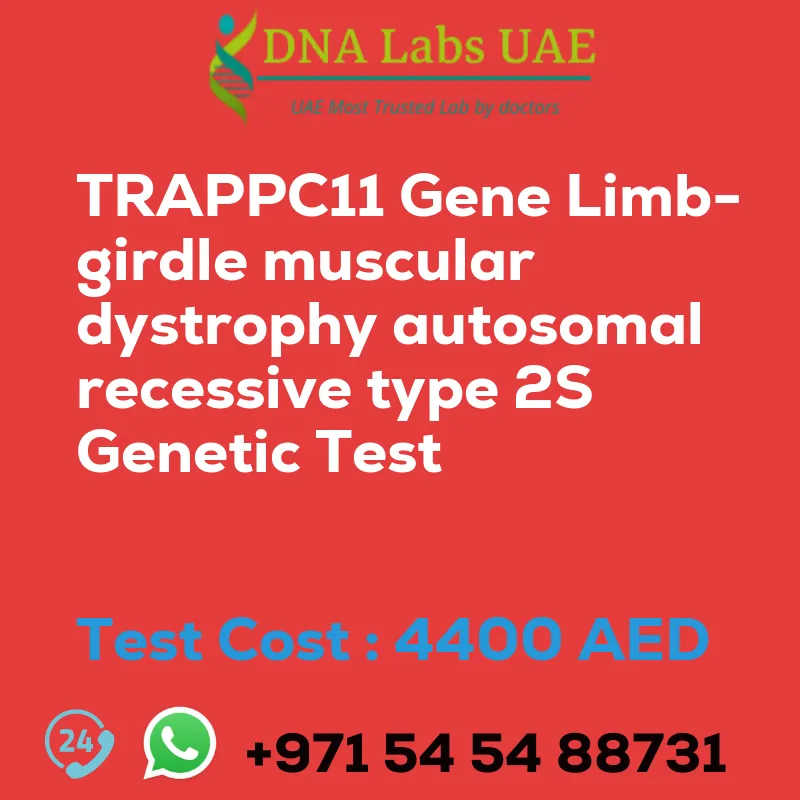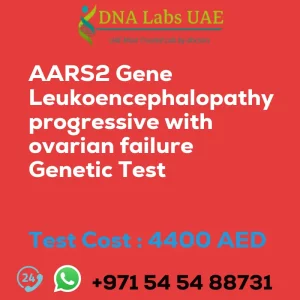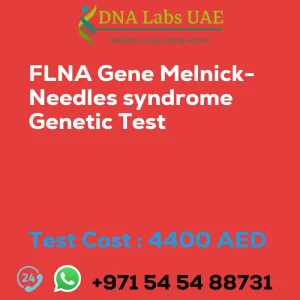TRAPPC11 Gene Limb-girdle muscular dystrophy autosomal recessive type 2S Genetic Test
Test Name: TRAPPC11 Gene Limb-girdle muscular dystrophy autosomal recessive type 2S Genetic Test
Components: Blood or Extracted DNA or One drop Blood on FTA Card
Price: 4400.0 AED
Sample Condition: Blood or Extracted DNA or One drop Blood on FTA Card
Report Delivery: 3 to 4 Weeks
Method: NGS Technology
Test Type: Neurological Disorders
Doctor: Neurologist
Test Department: Genetics
Pre Test Information: Clinical History of Patient who is going for TRAPPC11 Gene Limb-girdle muscular dystrophy, autosomal recessive type 2S NGS Genetic DNA Test. A Genetic Counselling session to draw a pedigree chart of family members affected with TRAPPC11 Gene Limb-girdle muscular dystrophy, autosomal recessive type 2S
Test Details
The TRAPPC11 gene is associated with a specific type of limb-girdle muscular dystrophy known as autosomal recessive type 2S. This genetic disorder is characterized by progressive muscle weakness and wasting, primarily affecting the muscles of the shoulders, hips, and thighs.
NGS (Next-Generation Sequencing) genetic testing is a type of genetic test that uses advanced sequencing technologies to analyze multiple genes simultaneously. In the case of limb-girdle muscular dystrophy, NGS genetic testing can identify mutations or variations in the TRAPPC11 gene that may be responsible for the disease.
NGS genetic testing can provide important information for diagnosis, prognosis, and treatment planning. It can help confirm a suspected diagnosis of limb-girdle muscular dystrophy and determine the specific subtype, such as autosomal recessive type 2S.
Additionally, NGS testing can identify specific mutations or variations in the TRAPPC11 gene, which can guide treatment options and inform genetic counseling for affected individuals and their families.
It is important to note that NGS genetic testing may not be available in all healthcare settings and may require a referral to a specialized genetic testing laboratory. Additionally, genetic testing should always be accompanied by appropriate clinical evaluation and counseling by a healthcare professional with expertise in genetics.
| Test Name | TRAPPC11 Gene Limb-girdle muscular dystrophy autosomal recessive type 2S Genetic Test |
|---|---|
| Components | |
| Price | 4400.0 AED |
| Sample Condition | Blood or Extracted DNA or One drop Blood on FTA Card o |
| Report Delivery | 3 to 4 Weeks |
| Method | NGS Technology |
| Test type | Neurological Disorders |
| Doctor | Neurologist |
| Test Department: | Genetics |
| Pre Test Information | Clinical History of Patient who is going for TRAPPC11 Gene Limb-girdle muscular dystrophy, autosomal recessive type 2S NGS Genetic DNA Test A Genetic Counselling session to draw a pedigree chart of family members affected with TRAPPC11 Gene Limb-girdle muscular dystrophy, autosomal recessive type 2S |
| Test Details |
The TRAPPC11 gene is associated with a specific type of limb-girdle muscular dystrophy known as autosomal recessive type 2S. This genetic disorder is characterized by progressive muscle weakness and wasting, primarily affecting the muscles of the shoulders, hips, and thighs. NGS (Next-Generation Sequencing) genetic testing is a type of genetic test that uses advanced sequencing technologies to analyze multiple genes simultaneously. In the case of limb-girdle muscular dystrophy, NGS genetic testing can identify mutations or variations in the TRAPPC11 gene that may be responsible for the disease. NGS genetic testing can provide important information for diagnosis, prognosis, and treatment planning. It can help confirm a suspected diagnosis of limb-girdle muscular dystrophy and determine the specific subtype, such as autosomal recessive type 2S. Additionally, NGS testing can identify specific mutations or variations in the TRAPPC11 gene, which can guide treatment options and inform genetic counseling for affected individuals and their families. It is important to note that NGS genetic testing may not be available in all healthcare settings and may require a referral to a specialized genetic testing laboratory. Additionally, genetic testing should always be accompanied by appropriate clinical evaluation and counseling by a healthcare professional with expertise in genetics. |








